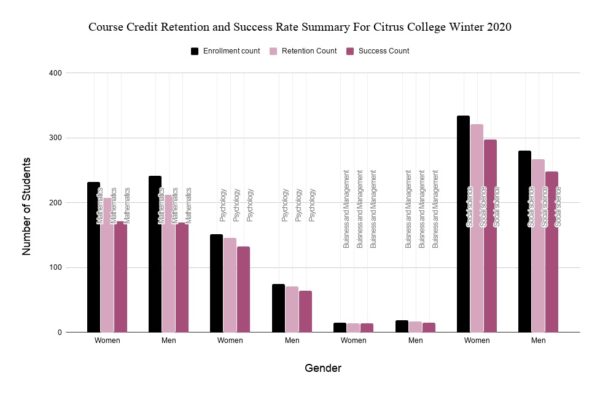An update was made to this story at 9:50 p.m. April 27 to reflect an infographic portraying new information, also added in the story, about the credit course retention and success rate from 2020 for both men and women in subjects such as mathematics, psychology, business and management and social science.

On average Citrus College women attendees have higher enrollment, retention and success rates than men.
A chart from the California Community College’s website about the credit course retention and success rate portrays numbers from the Citrus College winter 2020 course, for mathematics, psychology, business and management and social science.
The chart shows women outperforming men in a majority of the degree-applicable studies portrayed in the chart.
Also, in 2018 Student Success Scorecard metrics system, a webpage with statistics on datamart.cccco.edu said females were ahead with a 5% margin, 77.2% for females and 72.7% for males, indicated at various levels of 30 units of college credit.
The Students Success Scorecard measured students’ retention rate and transfer velocity by breaking down how prepared the students were at time of enrollment and transfer.
The scorecard also said how well the male and female students are doing in accordance with the completion ratio, how many units they’re taking and how many students enrolled are actually transferring to universities. The scorecard includes on-line and vocational courses.
The two possibly most vital pieces of information in determin ing whether or not women are out performing men academically are the grade distribution and the GPA differential between genders.
ing whether or not women are out performing men academically are the grade distribution and the GPA differential between genders.
Taking into account 20,000 students enrolled into Citrus College and 52% of them are women against 44% men, which would then explain women having a higher margin than men.
The data and research is similar state-wide. Women exceed men in all areas at a margin of anywhere from 1.3% to 7.2%. However this does not answer the intrinsic question whether or not women are smarter.
Before a decision is made it is best to take a look at how ethnicity and the increasingly large number of hispanic women have played a part in the educational system.
College education is becoming increasingly more important than it ever has, predominately in minority women. An article from publishing company the Atlantic said 22% of women in 2016 ages 25 to 29 received a bachelor’s degree compared to 16% of hispanic men.
Hispanic women are not the only ones. The prevalence of equality has never had a greater time in our history considering the long line of discrimination and exclusion that women have faced in the past.
“Today, for example, women comprise a growing majority of students on college campuses in the U.S., up from around 40%in the 1970’s,”the Atlantic said in the article ‘Boys don’t read enough.’
Director of Institutional Research Lan Hao was able to provide some clarity of opinion and advice on accessing the data sheets for the differences in academics, along with some breakdown on the calculation of the GPA.
Hao said the data can determine whether or not women get better grades than men.
“Yes, this most likely means women are getting better grades than men,”Hao said.


